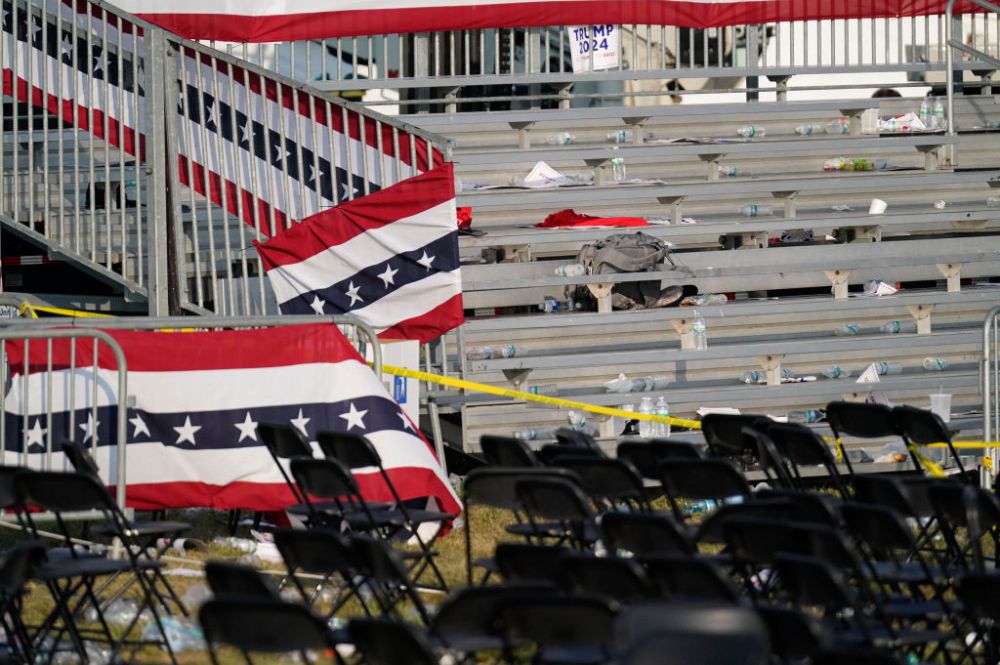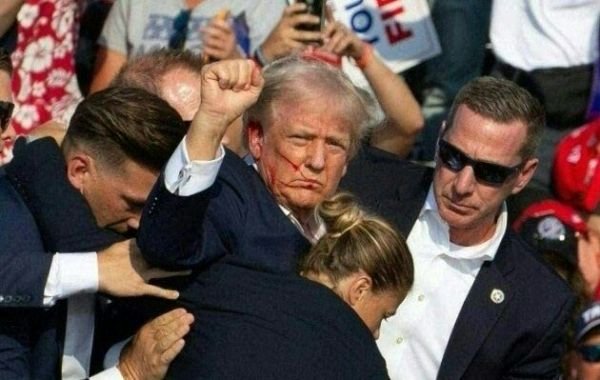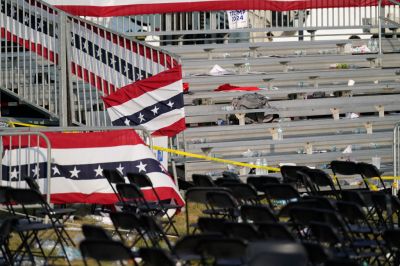On Saturday morning, New York Times reporter Jonathan Swan shared the news online that he’d become a naturalized U.S. citizen. Scrolling past it, I had two thoughts.
First: Congratulations! It’s heartwarming to see an immigrant excited about becoming an American, even for those of us who have lost all sense of national communion.
Second: This is like putting your life savings into Enron in 2001.
The bankruptcy analogy was still on my mind a few hours later when an assassin missed a kill shot aimed at the body politic by roughly an inch. “Gradually, then suddenly” is how Hemingway famously described the process of going bankrupt. That’s how America’s civic collapse over the last 10 years has proceeded too: Gradually, and then—almost—very suddenly in Pennsylvania.
The strange thing about the attempt on Donald Trump’s life is how familiar elements of it felt despite the fact that political assassinations in the U.S. are rare. (Although not that rare.)
To start with, there was a massive institutional failure by an arm of the federal government. The Secret Service will eventually muster some excuse for why it let a rooftop with a clear line of sight to the former president’s podium go unpoliced, but there is no excuse, obviously. They screwed up. Uncle Sam does it a lot nowadays.
There was Trump himself, a creature of instincts, reverting to instinct at a primal moment. Pumping his fist, playing to his fans, exhorting them to “fight, fight, fight” as bullets whizzed around was the essence of his persona laid bare by danger. It was an impressive show of bravado by someone whose bravado isn’t as impressive when the cameras aren’t on.
Then there was the shooter, the very picture of the nebbishy loner we all expect whenever news breaks of another school shooting. Bullied by classmates, drawn to guns: He was so stereotypical that a relative told me she wondered if he directed his homicidal urges at Trump simply because schools are out for the summer.
In fact, as details about the gunman emerged on Sunday, right-wing demagoguery on social media about the great unspecified “they” who are supposedly to blame for the shooting seemed to quiet down a bit. Maybe MAGA types were mollified by Joe Biden and other Democrats scrambling to send well wishes to Trump, but I suspect their own hunches about what typically motivates nerdy young weirdos to kill began to inform their theories of what happened.
We may yet learn that the assassin was a left-wing radical driven to murder by Biden’s warnings about democracy being on the ballot this fall. But no one will be surprised, I think, if it turns out that he was just another twisted young man starved for respect who thought his own show of bravado involving an AR-15 would earn him some in death.
His epitaph should read that he was an enemy of democracy. There are a lot of them in this story.
Political violence inspires tedious writing because most commentators are decent people and decent people all have the same predictable reaction to it.
“It’s time to cool it down. We all have a responsibility to do that,” the president said in his address from the Oval Office on Sunday night. Everyone involved in politics who cares about their country—even those at the periphery—will reflect that same priority because they understand the implications of not doing so.
I’m no exception.
Assassins are enemies of democracy. They’re murderers too, of course—one of the bullets meant for Trump killed a father of two—but they warrant special hatred for their affront to the political order. It’s one thing to kill, it’s another to deprive hundreds of millions of citizens of their choice of national leader. The words “rigged election” have been wildly overused since November 2020 but assassination really is election-rigging of the highest order.
It’s not regicide. It’s an attack on the people themselves.
Assassins are also enemies of liberalism. We can debate the finer details of what liberalism requires of its supporters, but granting people the right to advocate for bad policies without fear of having their heads blown off is part of the basic package. You might think you believe in freedom of speech and of association, but if you’re willing to murder someone for exercising those rights in a way you don’t like, you don’t.
The paradox of liberalism is that it doesn’t withhold its protections from those who oppose it.
That’s not because it’s inherently virtuous; it’s because liberalism with exceptions is nonsensical. If it’s okay to shoot Donald Trump because his vision for America is illiberal, then America is already illiberal. To embrace exceptions is to set the rules of engagement in fascists’ favor. at that point, all we’re arguing about in November is which side gets to exploit the power of the federal government to terrorize the other.
The paradox of liberalism is that it doesn’t withhold its protections from those who oppose it.
You can’t save liberalism by forfeiting its moral superiority to the alternative. We are not going to murder our way to a healthier America.
The very idea of trying to do so reminds me of a phenomenon doctors observed early in the pandemic, when some patients succumbed not because they responded too weakly to the virus but because they overreacted. Their immune systems went haywire, producing so many antibodies that the resulting hyperinflammation ended up killing them instead of the COVID itself.
In politics, as in virology, sometimes the cure really is worse than the disease.
To all of that one might say that Trump is no ordinary advocate for illiberalism. He’s the frontrunner for president, has well-articulated authoritarian plans for a second term, and leads a personality cult unlike any in U.S. history. If ever there were a case where America might profit on balance from suspending the usual rules of liberalism, it’s this one.
But that’s silly even if you ignore my point about liberalism being devoured by its exceptions. It’s silly because, as regular readers know, there is no “Trump problem.” Trump’s influence exacerbates the actual problem, but removing him from politics won’t solve it. It will persist after he’s gone. And depending on the manner in which he departs, it could plausibly get much worse in his absence.
Again: We’re not going to assassinate our way to a more sensible Republican Party. If you think we are, I’m sorry to inform you that you’ve grossly underestimated the scale of illiberalism on the American right. However cynical you might think you are about Trump and the nature of his movement, it turns out you’re not cynical enough. Still, I understand why some find it galling to see Trump’s critics rally to his defense at this moment. It’s less a matter of believing that American life would improve without him than of resenting that so many have rushed to extend him a moral courtesy he routinely denies to others.
No American leader has done more to normalize violence as a tactic, David Frum noted on Sunday. Trump has raised the proverbial temperature so high that it’s now in liberalism’s interest to treat him as a sympathetic victim for the sake of anathematizing further violence than to shun him for having mainstreamed menace as a political tool:
The despicable shooting at Trump, which also caused death and injury to others, now secures his undeserved position as a partner in the protective rituals of the democracy he despises. The appropriate expressions of dismay and condemnation from every prominent voice in American life have the additional effect of habituating Americans to Trump’s legitimacy. In the face of such an outrage, the familiar and proper practice is to stress unity, to proclaim that Americans have more things in common than that divide them. Those soothing words, true in the past, are less true now.
Nobody seems to have language to say: We abhor, reject, repudiate, and punish all political violence, even as we maintain that Trump remains himself a promoter of such violence, a subverter of American institutions, and the very opposite of everything decent and patriotic in American life.
Trump has winked at or celebrated violence against his political enemies repeatedly, from offenses as grand as honoring the miscreants behind January 6 to ones as petty as mocking Nancy Pelosi’s elderly husband after he was nearly bludgeoned to death. When a child aroused by fire is warned not to play with matches and persists, it’s understandable to treat his inevitable singeing as a hard but useful lesson that might make him behave more responsibly.
But that’s more optimistic about Trump’s nature than I’m willing to be. And to believe that he had it coming amounts to taking what we might generously describe as an “anti-anti-assassination” view of what happened on Saturday. To hold that belief is to align oneself with the man who pulled the trigger, an enemy of democracy.
I won’t do it. But I also won’t align myself with his target, an enemy of democracy himself.
“One Democratic strategist who has worked on multiple presidential campaigns and on Capitol Hill said that the physical targeting of Trump robs Biden of his main argument against the former president,” NBC News reported on Sunday. The president has accused Trump many times of being a threat to the constitutional order but “that message is dead” now, the strategist said.
I’ve heard the same thing from friends. If Democrats believe it’s urgent to “cool down” the political temperature and speak more responsibly, how can they go on catastrophizing about Trump by insisting that “democracy is on the ballot”? The more apocalyptic their rhetoric is about his return to power, the likelier it is that another crackpot will take a shot at him.
I don’t know what Democrats will do, but I can tell you what I’ll do in this newsletter. I’ll go on catastrophizing about Trump because he is, in fact, a catastrophe for America’s civic tradition.
Democracy is on the ballot. If Republicans don’t like hearing that, they shouldn’t have nominated a coup-plotter and coup-enabler. Just as an assassin shouldn’t deprive Trump of his life or the people of their choice of leader, neither should he deprive me of my prerogative to point out that MAGA’s emperor isn’t wearing any clothes. The truth is the truth, no less so today than it was before that worm aimed and fired on Saturday.
Republicans understood that when it was more politically convenient to do so. In 2011, the left demagogued the Tea Party for its hot rhetoric about Democrats after Rep. Gabby Giffords was shot, despite the fact that the shooter turned out not to have a coherent motive. The right correctly recognized that at the time as a ploy to silence legitimate political criticism by equating it with incitement to violence.
In 2024, it’s Republicans who’ve decided that it’s untoward to criticize a politician who’s been wounded, however legitimate the criticism might be. “After today, I never want to hear ‘January 6’ from anyone on the left again,” read one post widely circulated on Twitter after the shooting. Some analysts complained that Biden’s reference to the insurrection during his Oval Office address was “polarizing” and unhelpful, as if political violence glorified by Republicans deserves some special exemption from appeals to national unity.
Sen. Mike Lee went as far as to say that the pending criminal cases against Trump should be dropped after the assassination attempt. (Good news, Mike!) “Trump might get shot again if we don’t let him do crimes” is a succinct summation of what modern Republicanism now stands for.
It should go without saying that none of this is sincere.
If it were, people like Lee wouldn’t have looked the other way for years as Trump and his fans nurtured a culture of political intimidation. Demanding that critics lay off of him post-shooting is simply their cynical way of pressuring Trump’s opponents into stifling their most potent objections to him. Republicans have no defense on the merits to the charge that he’s a threat to democracy—a charge Trump has also leveled at Biden, by the way—so they’re hoping to exploit the attack to rule the entire line of criticism out of order as “dangerous.”
Almost certainly, that also explains the curious news on Monday that Trump has turned over a new leaf since his frightening brush with death. He’s rewriting his convention address to ditch the invective against Biden and emphasize national unity, according to Axios. “I think it’s real,” Tucker Carlson told the outlet of the possibility that Trump’s heart, like the Grinch’s, grew three sizes since Saturday. “Getting shot in the face changes a man.”
Maybe. Stranger things have happened than a “dark triad” personality with a messianic complex embracing altruism after trauma—but not many. Trump’s rant this morning about the “January 6th hoax,” for instance, didn’t sound very unity-minded; neither did his new running mate’s tweet on Saturday blaming Joe Biden “directly” for the assassination attempt in Pennsylvania. But even if Trump really is momentarily disposed to take a softer approach to his enemies, the nature of his political movement is such that it can’t last. The cause of nationalism is to overcome and subjugate competing domestic tribes in order to establish supremacy. It doesn’t do “unity.”
I can’t know for sure, I suppose, but I assume Trump’s “Scrooge on Christmas morning” shtick is less about an earnest change of heart than about executing a strategy to reassure nervous swing voters that they can trust him with a second term. The obvious way to counterprogram Democrats’ warnings that he’s an illiberal maniac is to use his big stage in Milwaukee to present a low-key, kumbaya image instead. It’s shrewd, in keeping with the professionalism of his operation under advisers like Susie Wiles and Chris LaCivita.
So long as professions of unity serve Trump’s selfish interests, he’ll pay lip service to the idea. But if he ends up losing narrowly again in November, it’ll go down the toilet faster than it did even in 2020.
Meanwhile, Republicans will continue to lean into the idea that criticizing their nominee in dire terms as a threat to the constitutional order and a strongman with dictatorial pretensions is as irresponsible as shouting “fire!” in a crowded theater.
But it isn’t. There really is a fire.
And under those circumstances, it’s more irresponsible to say nothing than to keep quiet for the sake of “lowering the temperature” before everyone burns.
There’s a moral duty to shout “fire!” when a fire is raging, in fact, just as attendees at Trump’s rally fulfilled their moral duty to shout at police on Saturday to alert them to a gunman on the roof. If you believe in democracy and liberalism, you do neither any favors by letting your political rhetoric be dictated by what’s useful rather than what’s true.
It may not be “useful” at this delicate moment to say that Trump and his apologists are enemies of democracy. But it’s as true today as it was last week.
So long as we have elections in America—and there’s still one scheduled for 2028 [knocks wood]—there’s no conscientious way for liberals to put out a political fire except at the polls. If and when that changes, the calculus will change with it. But until it does, assassination isn’t a fire extinguisher. It’s gasoline.







Please note that we at The Dispatch hold ourselves, our work, and our commenters to a higher standard than other places on the internet. We welcome comments that foster genuine debate or discussion—including comments critical of us or our work—but responses that include ad hominem attacks on fellow Dispatch members or are intended to stoke fear and anger may be moderated.
With your membership, you only have the ability to comment on The Morning Dispatch articles. Consider upgrading to join the conversation everywhere.